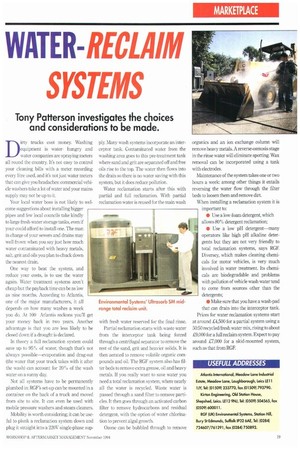WATER-RECLAIM SYSTEMS
Page 113

If you've noticed an error in this article please click here to report it so we can fix it.
Tony Patterson investigates the choices and considerations to be made.
Dirly trucks cost money. Washing equipment is waterhungry and water companies are spraying meters all round the country. It's not easy to control your cleaning bills with a meter recording every litre used, and it's not just water meters that can give you headaches: commercial vehicle washers take a lot of water and your mains supply may not be up to it.
Your local water boss is not likely to welcome suggestions about installing bigger pipes and few local councils take kindly to large fresh-water storage tanks, even if your could afford to install one. The man in charge of your sewers and drains may well frown when you say just how much water contaminated with heavy metals, salt, grit and oils you plan to chuck down the nearest drain.
One way to beat the system, and reduce your costs, is to use the water again. Water treatment systems aren't cheap but the payback time can be as low as nine months. According to Atlantis, one of the major manufacturers, it all depends on how many washes a week you do, At 100 Atlantis reckons you'll get your money back in two years. Another advantage is that you are less likely to be closed down if a drought is declared.
In theory a full reclamation system could save up to 95% of water, though that's not always possible—evaporation and drag-out (the water that your truck takes with it after the wash) can account for 20% of the wash water on a sunny day.
Not all systems have to be permanently plumbed in: RGF's set-up can be mounted in a container on the back of a truck and moved from site to site. It can even be used with mobile pressure washers and steam cleaners.
Mobility is worth considering; it can be useful to plonk a reclamation system down and plug it straight into a 220V single-phase sup ply. Many wash systems incorporate an interceptor tank. Contaminated water from the washing area goes to this pre-treatment tank where sand and grit are separated off and free oils rise to the top. The water then flows into the drain so there is no water saving with this system, but it does reduce pollution.
Water reclamation starts after this with partial and full reclamation. With partial reclamation water is reused for the main wash with fresh water reserved for the final rinse.
Partial reclamation starts with waste water from the interceptor tank being forced through a centrifugal separator to remove the rest of the sand, grit and heavier solids. It is then aerated to remove volatile organic compounds and oil. The RGF system also has filter beds to remove extra grease, oil and heavy metals. If you really want to save water you need a total reclamation system, where nearly all the water is recycled. Waste water is passed through a sand filter to remove particles. It then goes through an activated carbon filter to remove hydrocarbons and residual detergent, with the option of water chlorination to prevent algal growth.
Ozone can be bubbled through to remove organics and an ion exchange column will remove heavy metals. A reverse-osmosis stage in the rinse water will eliminate spotting. Wax removal can be incorporated using a tank with electrodes.
Maintenance of the system takes one or two hours a week: among other things it entails reversing the water flow through the filter beds to loosen them and remove dirt.
When installing a reclamation system it is important to: • Use a low-foam detergent, which allows 80% detergent reclamation; • Use a low pH detergent—many operators like high pH alkaline detergents but they are not very friendly to total reclamation systems, says RGF. Diversey, which makes cleaning chemicals for motor vehicles, is very much involved in water treatment. Its chemicals are biodegradable and problems with pollution of vehicle wash water tend to come from sources other than the detergents; • Make sure that you have a wash-pad that can drain into the interceptor tank.
Prices for water reclamation systems start at around £4,500 for a partial system using a 50:50 recycled/fresh water mix, rising to about £9,000 for a full reclaim system. Expect to pay around £7,000 for a skid-mounted system, such as that from RGF.






















































































































